Martin von Arndt, Stuttgart (D)
Martin von Arndt was born in Ludwigsburg in 1968. The author lives in Stuttgart and Pécs. Arndt was suggested as Alain Claude Sulzer's competition sponsor.
Download text in:
Word file format (*.doc)
PDFfile format (*.pdf)
Information on the author
Video portrait
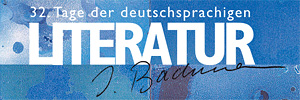
Martin von Arndt
Death is a Postman in a Hat (Extract from a novel)
Death is a postman in a hat. Every first Monday in the month he brings me a recorded delivery letter. He holds out his portable terminal and a pen that looks like carpenter's nail knocked crooked, and I scrawl a big circle, and in the middle of the circle a hook going from right to left and one from top to bottom, something that looks like a bold, a balanced signature and yet one deemed too easy. Then he, he's been calling me by first name for a long time now, hints at a smile, and fleetingly raises his index finger to the Tyrolean hat he's wearing. I offer him juniper berry schnapps in a small glass. He downs the spirit, throwing his head back and screwing up his eyes at the same time, shows his teeth, clicks his tongue loudly and slowly, smiles, again fleetingly raises his index finger to his hat and turns round on the threshold. I watch him for a moment, his ambling gait, produced by his scissor-like legs, and withdraw into my apartment with the empty schanapps glass and the recorded delivery letter. Then I sit down at the table. I push the chair back a little, in order to cross one leg over the other. I wait. Wait and look at the sometimes full, sometimes half full or empty juniper berry schnapps bottle, or the schnapps glass. I count the flies under the ceiling. Indecipherable insect script. A silent mobile. I wait. An hour or even two. I don't look at the registered letter.
When the time has come, to the outside observer it may appear like a having-become-ready, I move the chair closer to the table and open the envelope. Perhaps this time, something in me still always rejoices in anticipation of a new turn to the game. But no. Again only the empty sheet of paper folded once. The white sheet of paper reappearing month after month, an anonymous letter in a standard envelope, machine-stamped. This month as last. As the month before that. Today as always.
I received the first registered letter almost two years ago, on my fortieth birthday. Then my postman still compared the name on the envelope with that in my ID card, which he wanted to take a look at. He stopped short, when he saw that I'm German, shrugged, muttered something long-winded in Tyrolean, perhaps some word of pardon, I wasn't a bad person just because of that, and touched his hat. Then in exchange for my signature he handed me an envelope on which there was no sender's address, I saw the hat disappear down the stairs, and believed, when it was finally gone, in one of these Austrian peculiarities. Here the recorded delivery messengers wear a hat, not a cap, but a Tyrolean hat. Here everything just is a little folksy, I thought.
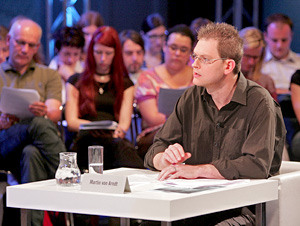
I took the empty sheet of paper out of the envelope as I was brushing my teeth. I studied both sides and investigated the envelope until I could be absolutely sure, that it didn't contain anything else. Definitely a mistake, the sender would be well and truly annoyed, when he realised at home, that the important documents were still lying on his desk and that he had sent nothing or as good as nothing for his money. He would resolve to set to work with greater concentration in future and have a new a new envelope ready
Despite my first impulse I didn't throw away the registered letter. There was absolutely no doubt that it was my name on the front after all and that there was no sender's name on the back, so that I would have felt it presumptuous, indeed, lacking in respect, to simply destroy this document.
I was forty years old. Exactly one year ago Ines had for the last time sprayed Bulgarian rose water on the bunches of flowers standing everywhere in our shared apartment (because otherwise, as she emphasised, roses nowadays no longer had a proper scent), she had given me back the keys and placed three notarized copies of our divorce certificate on the kitchen table.
I made a couple of copies for you, you never know when you'll need them."
As usual Ines didn't quite finish her coffee and put the cup in the sink (days later, as usual, and as if nothing had happened in the meantime, I splashed the remaining fluid on the floor in front of the dishwasher). Then she fleetingly leant her forehead against mine - I smelled the rose water - and said: "You keep the rubber tree and the flowers."
I nodded. It wasn't just the rubber tree I kept.
From then on when Ines announced a visit, I undertook tours of inspection through the apartment, so as to really hide everything that was a reminder of our time together. I didn't want to give her any opportunity to lower her head, to gently shake it once in this direction, once in that, and to mutter with a quiet disappointment in her voice: "Oh, Jo, what's past is past."
What's past is past. I thought about suicide. Or didn't think about it. And if I didn't think about it, then only because I had no desire, to actually emulate my father. The very person who had landed me with it all. My days went by monotonously, and I didn't know how to wring any personality out of them. I got up (too early), I made coffee (which I didn't like the taste of), I lay down in bed again, although I knew, that morally it wouldn't do me any good at all. I got up again (too late), went to snack bar and ate too much or only a fraction of what I had ordered; I was just about able to forbid myself the walk to the tobacconist, in this respect at least I wanted to show myself strength, after all I had given up smoking; even if I had only done so, because I once again wanted to stand before Ines as a new man.
Mother's funeral was the last time that I was in Germany with Ines, the last time that we had travelled anywhere together at all.
Even as we were sitting in the night train going north, she already knew that she was going to leave me, she just wanted to wait until the funeral was over and grant me two months mourning. Ines had come with me, because she didn't want to leave me alone, couldn't leave me alone with my conflicting emotions at a point in time at which otherwise not even nicotine would help me.
Contact with my mother had been rather sporadic. From one moment to the next I was no longer considered for any follow-up tour, the European musicals industry lay in ruins, if one were to believe the music agencies. On the telephone there remained nothing between my mother and myself, not even her half hour-long scolding, I had squandered my youth, her money on my musical education, indeed, my life, and should at least not end up like my father. And she probably couldn't speculate on us having offspring any more, my Ines and me, we should just leave the world to the rucola and the ants, children just didn't seem to be in fashion any more today.
All of that was in the past, was the bond, which had borne our telephone calls as if of its own accord.
Now, after we had exchanged words of greeting and informed each other about our health, the weather in Germany and Austria, we were silent. We were silent for a quarter of a euro. Then she said: "Are you tilting your chair again?"
"No."
"But I can hear it creaking."
I exhaled, brought the front chair legs down on the floor with infinite quietness.
"Really not?"
"But no."
"You shouldn't tilt the chair. You'll knock your brains out."
Another quarter euro disappeared into the silence. Finally I said.
"Mother, I'm hanging up now."
"Yes," she replied, "do that."
Then she hung up before me.
Ines didn't want to leave me alone with a dead mother, with the estate of a dead mother, with the estate of a dead mother in my head, before she, Ines, left me alone. I had seriously counted on being able to have a good cry on her breast, to experience a quiet cleansing, which would have a reconciling effect on our relationship. Yet in the three days that we threw ourselves at my mother's estate, we were further away from each other than ever. My wife did most of the work, she sought to keep everything unpleasant, everything that looked like a problem, away from me. She cleared all the rubbish out of my mother's apartment, which was close to becoming derelict. She sorted, put in order, gave instructions to the men clearing the place, she bribed the cemetery gardeners so that the grave would be cared for, she talked to the aged notary, who merely announced, that nothing remained of my inheritance, my mother lived expensively, despite first appearances. Amidst all the junk of childhood Ines came closer to me than any person had ever come before. And that finally drove her away from me. This closeness seemed to stick to her, to us. Ines feared, fled my touch, she refused me. Perhaps because I was still part of this mother, whose soiled incontinence inserts she pulled out of the blocked toilet, and would always remain a part of her, which would be, what was left of this mother at all.
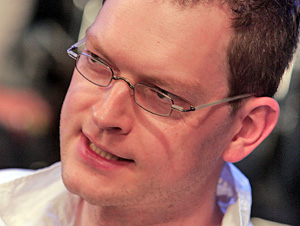
During this time we slept in an cheap hotel. Ines had insisted on that, she didn't want to spend the nights at least in mother's apartment. On the evening before our departure she was even less talkative. Everything was sorted out. Once and for all. We would take only the rubber tree with us, which she felt sorry for. She came out of the shower, threw herself onto the bed with wet hair, which she had meanwhile allowed to grow to shoulder length, and rubbed her temples. She seemed to be getting a headache. In her dark, hoarse voice, which had enchanted me since the beginning of our relationship, Ines groaned.
"Please, go and get me a water, Jo."
The circling of her fingers at her temples became more emphatic, I hurried down the stairs. I wanted to fetch the best water for Ines that she had ever drunk. A water that would not only get rid of her headache, no, one that contained my appreciation of her efforts of the last few days, one that would make her completely forget these days, that placed our relationship on entirely new foundations.
The vending machine stood isolated/abandoned in a half-dark entry area. I put in a coin, a display showed the current balance: +01.00E. Next to it a sticker warned against choosing empty compartments. I looked for the number of my drink, there was only water anyway, in four successive compartments, the other hotel guests seemed to keep themselves alive with beer. Carefully I checked the number and pressed the buttons. Nothing happened. Then one of the compartments wearily moved, creaked as if as assurance, that something at least was happening, but the bottle didn't drop down, the dispensing compartment remained empty. For a moment the number on the display flickered, (then) -01.00 lit up, then it jumped back to 00.00. I stood there, didn't have any more small change. Done everything wrong again, I thought, as I slunk upstairs.
‘What you see is what you get' her gaze seemed to say. Ines had already resorted to tap water.
On the journey back to Innsbruck, we sat in the restaurant car, the train was crowded, I had forgotten to reserve seats. Sometimes Ines watched my face in the window (I pretended I didn't notice), sometimes she lowered her head, shook it gently in one direction, then in another. Her fingers drew in the spilt coffee on the table top. Dot, dot, comma, dash - the face is ready in a flash. A piece of cheese, a lump of lard, and what do I see - a mother-in-law. I no doubt suspected that she wanted to erase my mother from my features, but she couldn't manage it.
She granted me two months of mourning.
Who, I began to ask myself, would go so far as to send me a blank registered letter month after month? And what for? Were these letters nothing more than a bad joke?
I would have though Ines capable of the empty/blank sheet of paper, at least as long as we were still a couple. It would have fitted with the reproaches/accusations she delivered/pronounced morning after morning before she went to work. Ever since I didn't get any contracts/jobs any more, (ever) since I spent my time at home and not in the studio any more.
That she couldn't be with someone, who had so few demands/expectations of life and above all who shrank back from anything that looked remotely like a career. That she could have no respect for someone, who didn't demand respect from her, because he didn't respect himself. That she didn't know how things would go on.
That I should at least once make an effort.
I made an effort. I firmly resolved, at least once to make an effort, so that Ines at last knew, how things would go on. Even if I hardly had a clue, at what I should make an effort.
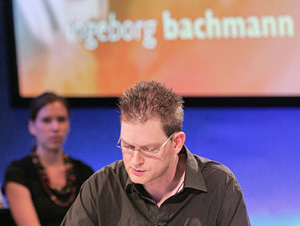
Every history of a relationship is a history of fights in the relationship. I had followed Ines to Innsbruck, because I wanted to be near her. A former student friend, who as a teenager had taken part in orchestra competitions there, blustered, Innsbruck was a pearl, only no one had found the oyster to go with it yet, never mind opened it. Apart from that there were a striking number of speech therapists, perhaps the regional dialect could be treated on health insurance.
Why not? I thought. I could move to Innsbruck with Ines and at least once make an effort.
So I found work with a musical circus, which sent me on tour(ing) through half of Europe. I played naive tunes in the semi-darkness at the rear of the stage. It felt as if every evening the audience listened to me reciting the letters of the alphabet in the right order and then applauded me enthusiastically for it.
I had a job which month after month washed four digit numbers, knowledgeably checked by Ines, into my current account. What I still didn't have, was satisfaction at the feeling of ‘at least once having made an effort at ‘it', of having found ‘it'.
But/Yet I loved it, when I came back in the early hours of the morning, hopelessly bleary-eyed, smelling as if I'd spent weeks on the night train, (and) stretched out beside Ines in bed, without even taking a shower, and scented the sunbeams which during the day had been caught in the blonde down on/of her arms. The sunbeams and the smell of cocoa. Ines was crazy about chocolate. From every tour he brought back some sweet speciality for her. She ate it/them, as others drink wine, or rather not, because good wine is chewed, she, however, crumbled the chocolate, and let the fragments/pieces melt in her mouth. She literally/really drank it. I remember, that the fluid which the next day I licked from her skin between pubic bone and upper thigh and swallowed, always smelled a little of noisette. After sex Ines put one leg across me, wrapped it around me, as if to cover me, (bed me), hide me, protect me from the world out there, which in a few days would take from her presence yet again. I had never told her, that as a child I had always slept completely wrapped in my bedding, so that not a breath of air got under it. Less because of the cold, but rather to feel secure and shielded on all sides. Ines seemed to know about that, she seemed to know so much about things I had never told her. That was one of the reasons I married Ines.
Ines was the first woman in my life who didn't judge me by my father. In our village in northern Germany everyone knew about it: I was the son of the man who killed himself. Everyone knew something, but no one knew any more. A state of affairs which little girls find hard to bear.
One evening my father went into the wood and didn't come back again. He was found the next morning next to the marksmen's club house. He had shot himself in the head with his hunting rifle. Ein aufgesetzter Schuss, it was two days work, to scratch blood and brains from the wall (of the building) and to repaint it. My father had shot himself, although or because he was a successful engineer. No debts, no blame. And my mother maintained: no depressions either. There was no reason for him to shoot himself in middle of his life, at the high point of his career. A death wonderfully in need of explanation. There was nothing could suddenly make a sixteen year-old boy with hands scratched bloody, who because of his flabby skinniness, which made pointed bones stick out of arms and shoulders, was almost monstrously unathletic, more interesting to (the) girls of the same age.
Evening walks regularly led the girls in my class and myself into the wood, where, when they caught sight of the club hose, they raised their eyes to me and lisped their question: "You know, why did your father do it?"
If I had known, I would have gladly said it, not least, to clear up (settle) this tiresome point between us and to have cleared the air to talk about something more appealing. But I didn't know (it). And my prospective girl-friends didn't want to offer their kisses without something in return.
Ines was different. She seventeen, tall, and unlike her predecessors, already a woman, with firm, protruding breasts. Her skin was dark bronze, she had a classic Roman profile, with sweepingly curved eyebrows, had a (tom)boyish haircut and dyed her hair deep black. She didn't want to go (in)to the wood, listened to my story, which I told her of my own accord, stroked my hands, she shrugged, brought her lips close to mine, in order to bite my lower lip. Then she kissed me with a grin. In return I merely had to promise her never to pick up a gun.
I refused to do military service.
And began to study guitar.
When I was seven my father had given me a wanderer guitar as a present. He himself was unmusical in a completely cheerful way, he gazed in admiration and admired every manifestation of my skills, which I gradually acquired on the/this instrument, as if they were the achievements of a precocious mathematical genius. It was beyond his (own) powers of imagination. I enjoyed playing, but made little genuine progress. Only after (my) father's death did I fling myself at the lessons. When I played, I was one hundred percent me and one hundred percent with my father, maintained my mother. That wasn't quite right. When I was playing, one at least didn't see my bloody, scratched hands any more. Or one didn't look at them. It was my face one paid attention to, not my movements. I copied elegiac expressions from the great jazz guitarists. And undoubtedly/inevitably not just the facial expressions.
My mother was very moved and would have financed anything, which stopped me from being like my father. And Ines, whom I had already been going out with for three years, saw a glittering career opening up before me. She was crazy for my musician's fingers, she caressed them, took them in her mouth after I'd been playing (they tasted of metal, the E major, the A major and the D major strings had passed on their aroma), and she wanted me to satisfy her by hand. I dreamed of my fingers in Ines' mouth, of my fingers between her thighs. I never dreamed of a career. Career, for me that was a bang in the night, that no one had heard, and splashes of blood on a wall, which had to be whitewashed as quickly as possible, what would the members of the marksmen's club think?!
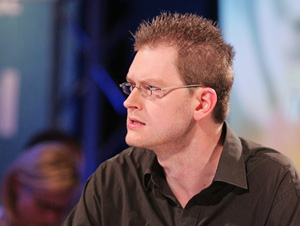
I completed my studies smoothly, I couldn't disappoint Ines and my mother. The guitar was a friendly pet, which didn't demand much of me.
But soon after our wedding Ines had already stopped using the instrument as a sexual stimulant between us. When she came home from fetching rolls and found me with the guitar in my hand, she tried to avoid my eyes, and silently sorted out what she had bought on the kitchen table. I had offered to be househusband for a few years, but she demanded more of me. More initiative. She didn't always want to take all the decisions alone, because there was nothing of my own, nothing original to be got out of me.
Ines took the coffee jug from the machine, to pour out coffee for us.
I had laid the breakfast table, as usual. I wanted to signal to her, that I was glad to get up with her, earlier than I had to. She spread low fat cream cheese on half a roll.
"You always just wanted your childhood back. And I finally want to grow up."
"What do you mean?"
I put down the coffee cup. I looked down at the two sugar cubes next to my plate.
"Which bit/part didn't you understand?"
"Why should I want to have my childhood back?"
"Perhaps because your father took it from you?!"
"My father killed himself, when I was sixteen. A bit late for childhood."
"And how would you call it then, your attempt, not to have to take/assume any responsibility for your own life?"
I hesitated. I said: "Rock'n'roll?"
"Oh God, Jo...!"
Ines rolled her eyes, shook her head gently to one side, then to the other.
"That's exactly what I meant."
Ines had finished off her second roll and washed it down with coffee.
"I have/get the feeling, you're not making any effort at all any more," she said into her coffee cup, like an oracle, I didn't for the life of me know, what she might have seen/read in it.
"Of course I make an effort, of course it's an effort - "
"So it's an effort for you to live with me?!"
"For me?"
"Yes, for you."
"I think it's more that you find it an effort with me."
"That's easy."
"What?"
"Turning the tables. You make it easy for yourself."
"I didn't mean it like that, I -"
"Don't be evasive again, stand by what you think for once."
"I'm not being evasive at all, I -"
"Yes?"
"Fuck, I've lost the thread."
"I have to go now."
"You have to go now."
She really had to go.
What we hope for and what we get - two pairs of boots and both of them pinch. That's what Ines may have been thinking, as disgust was written on her face, when she gave me a goodbye glance, as/while I stirred my coffee with the knife with which I had (previously) been spreading butter on my bread, so as not to make another spoon dirty or simply to save myself going to the cutlery tray/drawer.
I had followed Ines to Innsbruck, because I wanted to stay close to her. And because it couldn't (be allowed) end like that.
Ines didn't announce her last visit, I had no time to free my apartment/flat of our memories. She shook her to one side, then to the other.
"How long is this going to go on?" she asked, as she made coffee. She knew her way around my kitchen. She still had full rights in it.
"No idea," I lied, "no idea, what you're talking about."
"You have no idea, what I'm talking about. If you didn't want to forget me, that would be flattering at least. But you simply can't forget me. That's again something involuntary. There's not a bit of will-power to/in it."
I looked at her from the side. Her cheeks seemed softer, the cheekbone(s) was less prominent. Ines had become plumper. The coffee machine spluttered, Ines placed a full cup on the table in front of me. She had the sugar cubes ready. We had known each other now for almost 25 years. She still didn't know, how I take my coffee (white, no sugar, with her new boy friend, a successful jeweller, she no doubt remembered it after the first meeting). I swallowed/gulped (down) a big mouthful (black, no milk, no sugar), took one of her cigarettes and clumsily lit it.
"You're smoking again?" she asked.
"Yes."
"Since when?"
"Since just now."
Ines pursed her lips and wrinkled her nose. (And) yet I hadn't even told a lie. I was only smoking to get my hands free. Get them free of her gaze, to no longer feel it (her gaze) on my knuckles.
I resolved to put her to the test, by taking her into my confidence. I told Ines about my/the letters. She yawned and brushed a bleached strand of hair from her forehead, which as always caught in her (our?) ring.
"Is it a ‘letter' at all?" asked Ines, took a cigarette and flicked the packet across the table to me with a swift movement of her index finger.
I was offended, flicked the packet back. Ines sensed my mood and gave way with a calmer voice: "Is it a letter, if there's nothing in it, Jo? Do you really believe, that it's a letter?"
I didn't want to discuss it. But we discussed it. After one and a half hours of persistent going back forward over it, during/in which among other things she advised me to go to the police, Ines concluded, as she looked at her watch, with the lapidary words:
"Refuse to accept it."
I nodded, likewise looked at her watch and said: "You have to go."
Being together had exhausted me. Refuse to accept it - what nonsense! As if that would change anything. That would be like shouting to a drowning man: "Look lively there, my friend, and swim!"
I knew, that I would start to swim again, that Ines wouldn't stop liking me, without loving me again, and that therefore, she would rather mutate into a sophisticated jeweller's wife, than to send me these registered letters.
As she gave me a comradely farewell kiss she told me that her friend was opening yet another branch, this time in Bregenz. I thought about the fact, that the last registered letter had a Bregenz postmark.
The first Wednesday in the month was in two days.
Translated by Martin Chalmers

